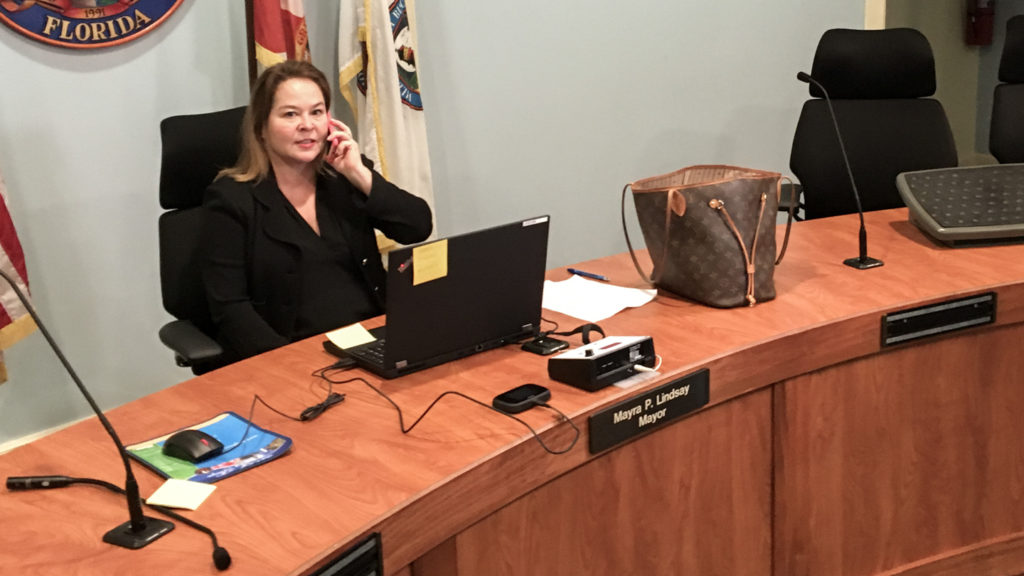Ex-Mayor Lindsay Demands Payment For Ethics Probe Fees, Says She Acted ‘Correctly’ In Closing Meeting
Tony WintonMay 20, 2019

Key Biscayne Mayor Mayra Peña Lindsay speaks to media during approach of Hurricane Irma, Sept. 7, 2017 (Tony Winton)
UPDATE: The Village Council deferred action on Lindsay’s request for reimbursement until it could study a proposed change to a portion of the Village code covering reimbursement of an officeholder’s legal expenses. A full story will appear in next week’s Key News.
After being rebuffed twice, former Key Biscayne Mayor Mayra Peña Lindsay is again asking the Village to pay more than $35,000 in legal fees she incurred during an ethics probe that ultimately cleared her of wrongdoing.
The investigation, which roiled Village Hall behind the scenes for months, centered on resident Don Elisburg’s ejection from a publicly-noticed “Sunshine” Meeting on March 1, 2018. The session involved Lindsay and Village Council Members Luis de La Cruz, Katie Petros and, briefly, Brett Moss, records show.
In twin letters this month, the former mayor and her husband, Al Lindsay, were adamant, demanding reimbursement that had earlier been rejected by Village Manager Andrea Agha. Al Lindsay, in a formal payment demand, said the investigation was “unfounded.” In a separate letter, the former mayor said the probe arose “out of my properly and correctly closing a public meeting.”
The former mayor’s May 16 letter was markedly different in tone from earlier statements she made to investigators. In sworn interview last Nov. 2 at the State Attorney’s office, Lindsay said she should have cancelled the meeting after being advised by Village Attorney Stephen Helfman that the session should not be closed. “Had I to do it all again, I would have apologized to everyone. I would have said, ‘Listen. We have to cancel this meeting. We need to leave the room now,” she testified, according to the transcript.
The tenor of the former mayor’s earlier testimony is cited as the reason the State Attorney’s Office declined prosecution. In a March 26 “close out” memo, Assistant State Attorney Isis Perez wrote, “The Mayor was contrite,” adding, “Based on the totality of the circumstances and Lindsay’s cooperation and candor, this matter is being closed without the filing of charges.”
The former mayor contends she intended to hold a discussion about collective bargaining negotiations. Such meetings can be closed under certain circumstances. The Florida Sunshine Manual states those circumstances are “for discussions between the chief executive officer or his or her representative.” Records show neither then-Manager John C. Gilbert nor anyone else from the Village administration was present at the March 1, 2018 meeting.
The ethics investigation swirled around the corridors of Village Hall during the summer and fall of last year, but went largely unreported. It was first disclosed by the Crespogram website. Multiple witnesses were interviewed and many documents, including text messages, were examined by investigators.
At one point, in an extraordinary move, Helfman sent a strongly-worded cautionary memo to the Council saying he had been contacted by the director of the Ethics Commission, Joe Centorino, about Key Biscayne’s Sunshine Meeting practices.
Helfman wrote June 1, 2018 that, according to Centorino, the Commission had gotten “several complaints” in addition to ones Helfman had received himself. His memo warned Council members that “Sunshine Meetings” should be “kept to a minimum” and broadly noticed to allow the public to attend, and should be recorded. The March 1, 2018 meeting was not recorded, but Council Member Petros took notes.
On Tuesday, Council Member Ignacio Segurola said he intends to support Lindsay’s reimbursement request. “It’s time to get past this,” Segurola said. He also plans on proposing a change to the Village’s existing reimbursement code so it covers officials’ expenses if no wrongdoing is found. Failure to do so, he said, could have a “chilling effect.”
“People would ask, ‘If I’m not covered by the Village, am I exposing myself to liability?’” Segurola said, noting legal expense coverage is commonplace for corporate and nonprofit boards and even other municipalities.
Elisburg, the resident who was ordered to leave the meeting, declined comment.


